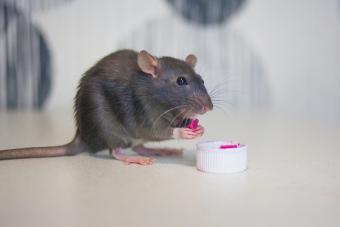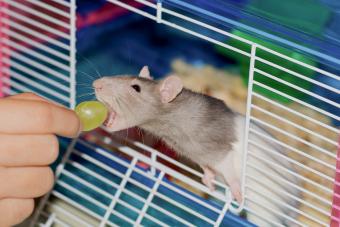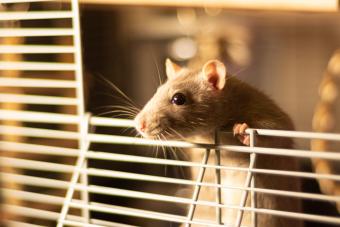
Feeding your rat with a nutritious diet is an essential part of their care. Pet rats tend to live longer than their wild counterparts because we treat them as cherished family members and offer them a diet tailored to their nutritional needs. By prioritizing their diet, you are giving them the best chance for a long, healthy life!
Start With a Commercial Diet
High-quality commercial rat food, available in pellet or block form, makes up the base of your rat's diet. These foods are fortified with necessary vitamins and minerals, plus essential nutrients your rat needs.
High-quality rat food is formulated with vitamins A, B, C, D, and E, plus minerals such as calcium and magnesium. Your rat needs all of these for a balanced diet. These diets also contain the proteins, carbohydrates, and other ingredients all rats require to stay fit and healthy. Protein content in a prepared rat food should be around 16%, and fat content should be around 8%, so check labels to make sure your food is appropriate for your pet.
Never substitute your rat's food with diets formulated for rabbits, guinea pigs, or hamsters. Rats are omnivores and need animal fats and proteins, which aren't available in small animal diets made for herbivores.
How Much to Feed Your Pet Rat
Pet rats require around 15 to 20 grams of food a day, or around 60 calories. You can weigh your rat's food and feed the same amount each day, but it's best to follow the guidelines listed on the bag of food you choose to feed. Prepared diets are formulated differently, so each pellet or cube may not contain the same amount of nutrients.
Supplement your rat's regular base diet with fresh items daily. These treats should make up around 20% of your rat's food intake. It can be difficult to know for sure if your rat is eating, because they like to hoard food, like all rodents. Even if they empty their food bowl, you can't be sure they ate everything.
Because rats hide food, and they are so small, it is very easy to overfeed your rat. Limit their treats and try to watch them eat during feeding time to make sure you aren't overfeeding.
What to Do If Your Pet Rat Is Overweight
Figuring out if your pet rat is overweight isn't always easy. Every rat is different, but the average adult weight for males is around 267 to 500 grams (or about ½ to 1 pound), and between 225 to 325 grams (or about ½ to ¾ of a pound) for females. However, some adult rats can weigh as much as 1½ pounds!
Stick to your feeding guidelines and watch your rats for signs of weight gain. A healthy adult rat should be long and appear thin. If your rat starts to take on a round look, they're probably overweight. Cut back on treats and make sure your rat is eating the appropriate amount of prepared food each day. You can also add exercise into their routine and take them out for play sessions every day.
It's a good idea to weigh your rat each week and record their average weight in grams. That way, as your rat gets older, you can track their weight gain and adjust their diet if you notice them putting on a few grams.
Fresh Foods for Rats

You can offer fruits, veggies, and proteins in addition to your pet rat's pellets. This adds variety to their diet, but you should feed these items in moderation. Rats can eat the following fresh foods:
- Fruits: Apples, bananas, blueberries, strawberries, pears, peaches, grapes, raspberries, and tomatoes
- Vegetables: Broccoli, carrots, peas, spinach, kale, bell peppers, cucumbers, squash, and plain cooked pumpkin without spices
- Protein sources: Cooked chicken or turkey, cooked fish without bones, boiled eggs, scrambled eggs, mealworms, and crickets
Introduce new foods gradually in small amounts to prevent digestive upset. Also, while these fresh foods can supplement their diet, it's crucial to provide a base of high-quality commercial rat food to ensure they get all necessary nutrients. Just remember, don't overfeed, and limit your rat's treats to about 20% of their overall diet.
Even though there are more food items you can offer your pet rat, this will give you a good start. If there's anything you want to offer your pet rat that isn't on this list, do your research and make sure it's acceptable first.
Foods Rats Need to Avoid
While rats can eat a variety of foods, there are certain things that are harmful or even toxic to them. Here are some foods you should avoid feeding to your rat:
- Apple seeds and other fruit pits or stones: They contain cyanide, which is toxic to rats.
- Blue cheese: The mold in blue cheese can be toxic to your rat.
- Candy and sweets: Foods that are high in sugar can lead to obesity and other health problems in rats.
- Carbonated drinks: These can cause serious bloating in rats, which can be fatal since rats can't burp.
- Chocolate: It contains theobromine, which is toxic to rats.
- Citrus fruits (for male rats): The skin contains d-limonene, which can cause kidney damage and cancer in male rats.
- Green bananas: They inhibit starch-digesting enzymes.
- Green potato skins and sprouts: They contain a toxic chemical called solanine.
- Onions: They contain a compound that can damage red blood cells in rats, leading to anemia.
- Poppy seeds: Feeding these may potentially lead to neurological damage and can be fatal.
- Raw artichokes: They inhibit protein digestion.
- Raw beans: Certain types of raw beans contain toxins that can be harmful to rats.
- Raw Brussels sprouts: They can cause bloating in rats, which can be dangerous.
- Raw sweet potato: It contains compounds that are toxic to rats.
- Rhubarb: It can lead to kidney failure.
When to Feed Your Pet Rat
You should feed your rat at dawn and dusk. Wait for your rat to finish eating, then remove any uneaten food. Finding the right amount for your rat could involve some trial and error. By only feeding what they will eat in one sitting, you will reduce waste and ensure your rat eats fresh pellets at each meal.
If your rat grabs food and brings it somewhere to hide, don't worry. Rats are natural foragers and may hide some food for later. As long as it's not something that can spoil, it's not a big deal.
Keep Water Fresh

Rats must have a constant supply of fresh drinking water. To ensure their water stays clean, keep it in a bottle they can drink from rather than a bowl, which can become contaminated or spill on their bedding. You should still check their water bottles twice per day and refill them at least one per day to keep the water fresh and prevent bacteria from growing.
If you have more than one rat, place multiple bottles in your rats' cage so they aren't competing for water.
Your Pet Rat's Health Starts With a Balanced Diet
Providing a nutritious diet for your rat ensures they remain happy, fit, and active. Remember, each rat is unique, and their dietary needs might vary based on age, health status, and activity level. Watch your pet rat's weight and food intake. Then, use trial and error to learn what works and what doesn't while being sure not to offer any foods that are bad for their health.







